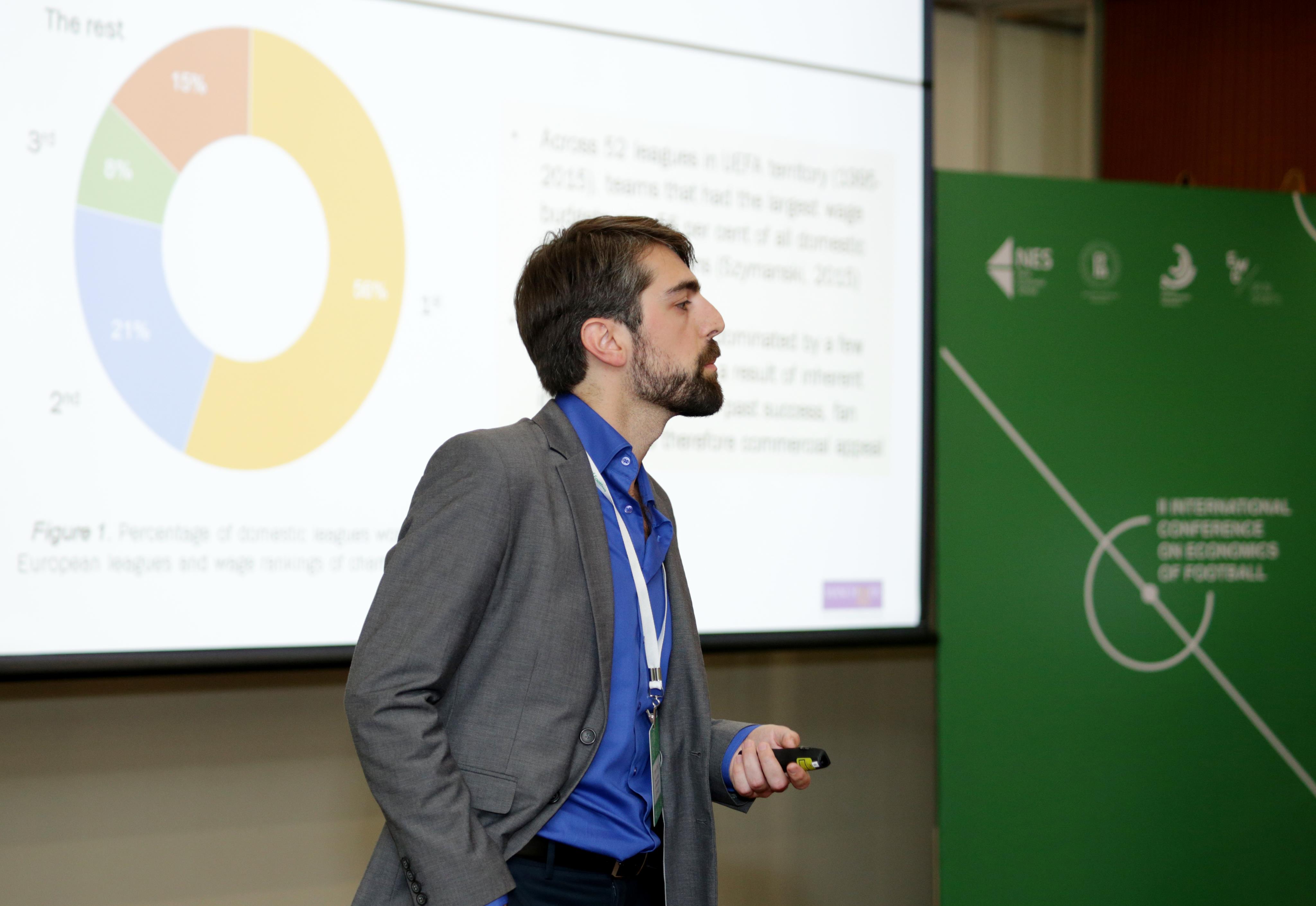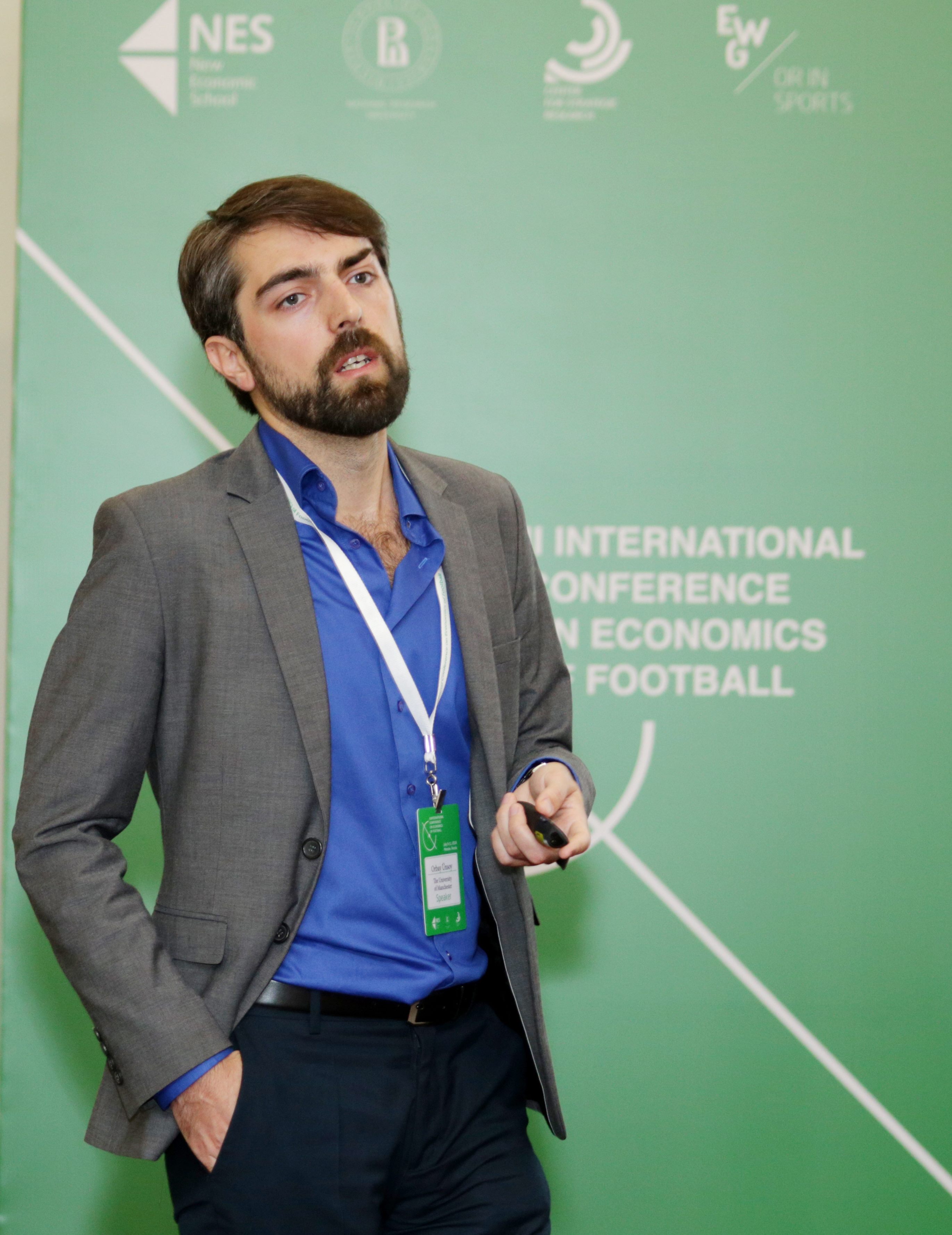Our graduate Orbay Ünsoy shares his story in a recent interview.
We recently interviewed our alumnus Orbay Ünsoy, an LBS graduate of the International Management and Leadership class of 2016, who decided to continue his education on a PhD level in Business and Management at Alliance Manchester Business School. In a recent interview, he shared his story, his memories of the times at LBS as well as his latest achievements.
Orbay’s research interests lie at the intersection of player recruitment, performance management and sporting strategy in football. At the moment, he is working on function-based categorization and market valuation of footballers in Bundesliga, La Liga and Premier League via data analytics, machine learning and predictive modeling. His recent research project focuses on football analytics: Developing a Decision-Making Framework for Effective Player Recruitment in European Football Clubs.
Orbay at the 2nd International Conference on the Economics of Football
The final objective is to build a decision-making framework for player recruitment. Every year, clubs find themselves in a position to improve their squads and replace their key players, either because they’re getting old and slow or because they would like to move to a club that pays a better salary and/or promises more trophies. To be able to do this, I use cluster analysis to categorize player functions, neural networks to examine player valuations and multiple criteria decision-making methods to approach the problem as a whole.
2) Why is it a significant topic?
The European football market had total revenues of 25.5 billion euros in 2016/17, and clubs in Big Five countries, consisting of England, France, Germany, Italy and Spain, accounted for 69 per cent of the whole market. A key challenge for the majority of clubs is that every league is dominated by the wealthiest few who can afford the best players. Likewise, the Champions League is most likely to be won by English, Spanish and German clubs.
To cut through higher spending power, a club has to create a competitive advantage in player recruitment and development based on a distinguishing playing style. Borussia Dortmund, Atletico Madrid and Leicester City are rare examples of recent surprises in the three most revenue-generating leagues. Their success owes to organizational capability building, rather than merely to individual talents of their players and head coaches/managers. So, a major challenge is to create evidence-based business processes within a well-developed sporting strategy.
Orbay during the 2018 FIFA World Cup
3) How can we make this possible?
I think that this could be done via establishing cooperation and trust between retired football players, experts from management backgrounds and sports science practitioners. As in any other business, decision makers in football are prone to systemic cognitive biases such as overconfidence, availability and confirmation bias. It is usually considered a weakness for an expert to sound unsure, especially so in a masculine environment like a football club. So, decisions regarding multi-million euro investments might be made via comparing several raw performance statistics based on a limited shortlist offered by player agents. Another commonly observed habit is that coaches and executives can cherry-pick a part of the analysis provided to them that fits their initial judgment on a player. That is why business processes shall be in place to tackle these biases, to double check on expert intuition and to offer sufficient due diligence. Otherwise, clubs shall be prepared to waste millions that could potentially be invested in grassroots activities, youth development and training facilities.
4) How well are LBS students prepared to pursue a PhD?
Very well prepared, considering the many academic writing classes and master thesis research. In our cohort, I had many friends who possessed the required analytical and communicational skills to pursue a PhD. It’s just a matter of finding a worthy problem and digging deep. I have recently come across the news that an academic paper involving two graduate research assistants at LBS was published and I wasn’t surprised at all.
5) How did studying at LBS contribute to where you are at the moment?
At LBS, I had the chance to re-examine the individual and organizational attitudes and actions I have observed during my professional experience. I also gained a more comprehensive understanding on a wide range of relevant topics to football management such as strategic management, performance management, personal assessment and development, and organizational behavior. When I approached my professors whilst shaping my master’s thesis and PhD research proposal, I always received constructive feedback on my work and ideas.
6) What would you advise current LBS students who are considering a PhD?
Well, I would recommend them to do their best to pick an original master’s thesis topic. Because it helps you to discover a gap in the area you’re interested in rather early. In the first year, they can start talking to several supervisor candidates. And there is little reason to be scared of the demanding ones because their feedback can be very helpful in the end.




Recent Comments